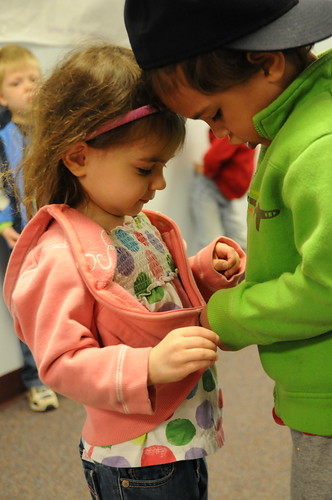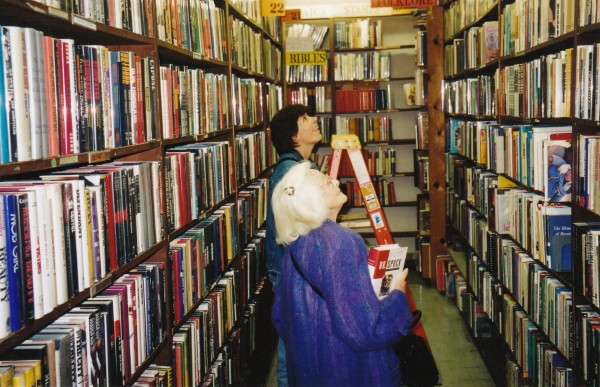Toddlers may not be able to say many words, but they can sure let us know how they feel about all those people who keep telling them what to do. “No!” “Not now! “Go Away!” (From 1, 2, 3…. The Toddler Years: A Practical Guide for Parents & Caregivers)
The Central Coast Early Care and Education Conference took place this past Saturday at Cabrillo College in Aptos. I was particularly excited to attend a workshop given by Sandy Davie, Nora Caruso, and Sharon Dowe of the Santa Cruz Toddler Center. The Toddler Center was founded as a non-profit in 1976, by two working women who were concerned about the lack of quality care for very young children. The first of its kind in the Western States, the center’s philosophy and practice is based on Resources for Infant Educarers (RIE) , the program founded by infant specialist Magda Gerber.
It is always inspiring and uplifting to listen to and learn from others who are involved in and passionate about ideas and work similar to my own. One of the things I most miss about working in a childcare center is the collaboration with, and support of colleagues. It can sometimes be a little bit lonely and a little bit hard to be the sole adult at home caring for a toddler (and his sister) even though I have chosen this work and love doing it. ( My role as a nanny gives me great compassion and insight into the challenges parents face – especially stay at home Moms or Dads.)
Little did I know I was to have the opportunity to participate in an exercise that would serve as a powerful reminder of the importance of slowing down, and including the child I’m caring for in whatever is happening. Another workshop participant and I were asked to imagine we were one year old children playing happily together. (We were given a pad of post it notes as our toy.) All of a sudden, as I was happily crumpling the paper, and experimenting with the sticky strip, one of my “teachers” approached me from behind, and without any warning, tried to put my jacket on. She was talking to me loudly about hurrying up to get ready to go outside. I resisted her by turning away, and refusing to put my arms in the jacket. I glared at her, and told her “No”, but she insisted, saying I would be cold if I didn’t put my jacket on, and telling me she didn’t understand why I was being so difficult. I could tell she was frustrated with my resistance, but her frustration only fueled my fire. Then we stopped the role play and processed what had just happened. I can’t tell you how irritated I felt. I actually didn’t hear much of what my “teacher” was saying to me, so intent was I at fending off her unwanted ministrations. All of her talking just sounded like noise to me. The whole experience felt a little like having a mosquito buzz in your ear while you are trying to sleep.
Next, the exercise was repeated, but the “teacher” moved more slowly, came to me and made eye contact, and let me know that in a few minutes it would be time to get ready to go outside to play. I wasn’t surprised when she returned a few minutes later and told me it was time to put away my toy and get ready to go outside. She explained it was cold outside, and she thought I’d be more comfortable if I wore my jacket. She gave me the choice of getting the jacket from my cubby by myself, or going with her and doing it together. She asked me if she could help me put my jacket on, before continuing. This time, I understood what was happening, and what she was requesting, and it was easier for me to cooperate with her. But something unexpected happened. When my “teacher” went to zip my coat, I suddenly had a strong urge to resist. I wanted to do it myself! I stepped back, and pulled the zipper from her hands. She understood, and acknowledged, “You want to try to zip your jacket by yourself.” She then let me spend a few minutes trying to zip the jacket before asking if she could help me by starting the zipper for me. What a different feeling I had inside this time!
Fast forward to today. It started raining just as J. and I were about to walk out the door to pick up his sister from school. We were running a few minutes behind due to the fact that he had slept a little later than usual, but since we were walking, I had to stop to get his rain jacket. I was feeling a little rushed, and was grateful when J. happily cooperated with putting his jacket on. But, as I reached to zip the jacket, he stepped back and said “No Lisa, I do it myself.” My first impulse was to tell him we didn’t have time, and I would do it for him, and he could do it next time, but suddenly I just stopped, took a breath and said “OK, you try.”
In the moment J. stepped back, I had a flashback to Saturday, and I literally felt, in my own body, J.’s absolute need to try to do the zipper himself . I waited quietly while he tried once, twice, three times. He narrated, “I can do it.” “Hey almost.” “It goes here,” as he tried to fit the two pieces of the zipper together. It felt like a long time to me, but it was actually only two minutes. When he looked up at me, I gently asked, “How about if I start it for you, and you can finish zipping it?” He nodded, and so I bent down, and fitted the two pieces together, and he zipped the jacket easily. He broke into a huge grin, and he pulled himself up tall. The message was clear- he felt satisfied and proud of himself. He took my hand and we set off for school together.
Have you guessed the secret to turning a toddler’s “No!” into a “Yes!” yet? My willingness to step back and wait for J. to try to zip his own jacket most likely avoided a power struggle between us. So many times, my ability to just let go, and wait a minute (or not) determines whether or not a struggle will ensue. I admire J.’s strong spirit, his fierce independence, and his desire to try things for himself. And the experience I had on Saturday reminded me of just how important it is for me to slow down, and give him the time and the respect of allowing him to participate fully in whatever we’re doing together, as often as possible.


